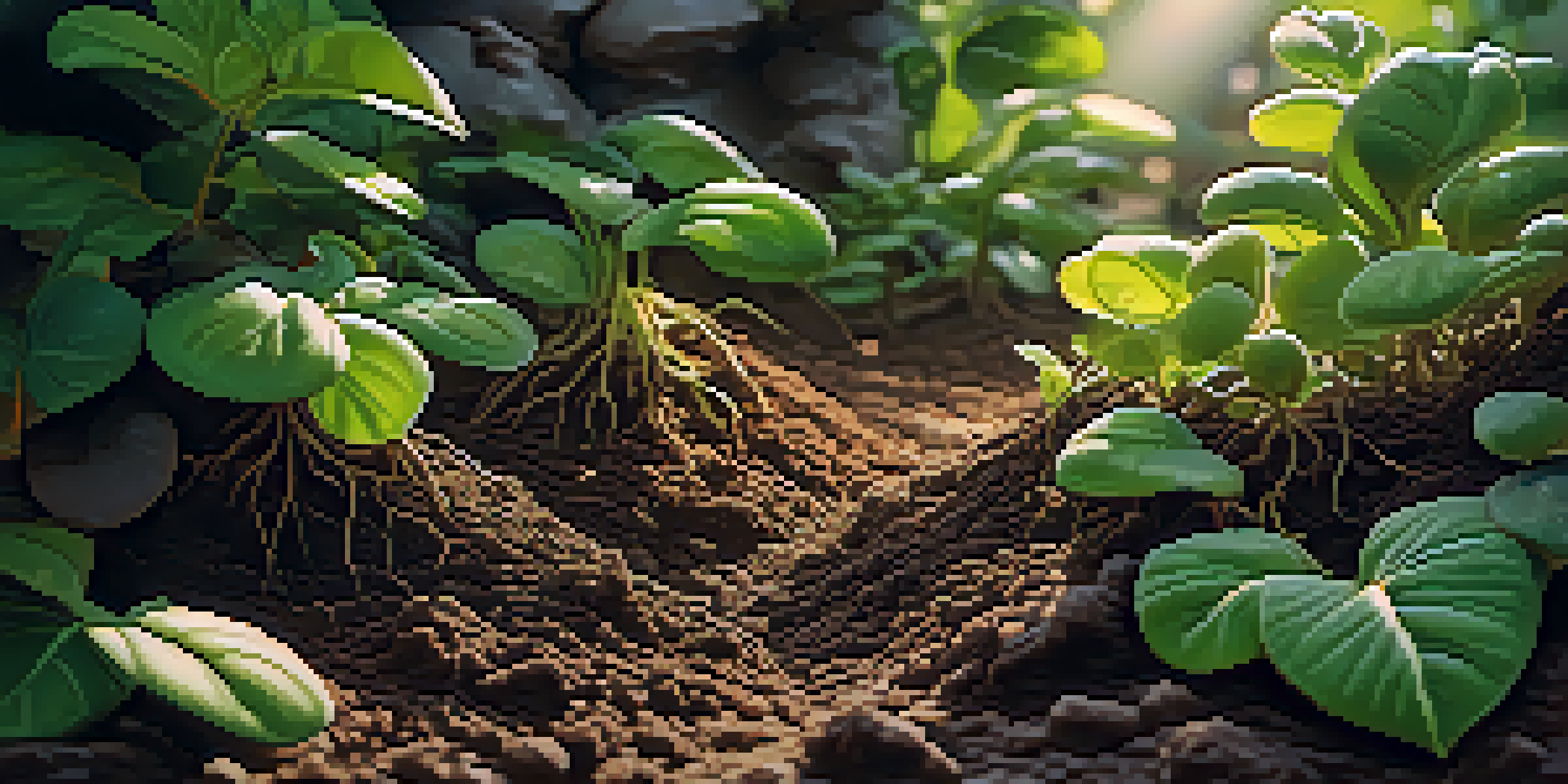Understanding the Connection Between Plants and Soil Health

The Foundation: What is Soil Health?
Soil health refers to the condition of soil in terms of its ability to function effectively as a living ecosystem. Healthy soil supports plant growth by providing essential nutrients, water, and a habitat for microorganisms. Think of it as the foundation of a house; without a strong base, everything built on top will suffer.
Healthy soil is the foundation of healthy food, and healthy food is the foundation of healthy people.
Good soil health is characterized by rich organic matter, a diverse population of soil organisms, and a well-structured environment that allows for air and water movement. Some key indicators include soil pH, nutrient levels, and the presence of beneficial microbes. Just as a balanced diet is crucial for our health, balanced soil conditions are vital for plants.
Maintaining soil health is not just about what we put into it with fertilizers; it involves understanding the complex relationships within the soil ecosystem. This includes the interactions between soil minerals, organic matter, and living organisms. When we nurture soil health, we create a thriving environment for plant life.
The Role of Plants in Soil Health
Plants play a crucial role in enhancing soil health through their root systems and leaf litter. Their roots help anchor the soil in place, preventing erosion, while also creating pathways for air and water to penetrate. This is similar to how our own roots, in the form of strong family ties, provide stability in our lives.

Additionally, plants contribute organic matter to the soil when leaves fall and decompose. This process enriches the soil, adding nutrients and improving its structure. Think of this as a natural recycling system where plants give back to the earth what they take, fostering a balanced ecosystem.
Soil Health: Foundation of Ecosystems
Healthy soil acts as the essential foundation for plant growth, providing nutrients, water, and a habitat for microorganisms.
The relationship between plants and soil is symbiotic; as plants grow, they support soil health, which in turn supports their own growth. This interdependence highlights the importance of maintaining healthy plant communities to ensure robust soil ecosystems.
Microorganisms: The Unsung Heroes of Soil Health
Beneath our feet, a vibrant world of microorganisms works tirelessly to enhance soil health. These tiny organisms include bacteria, fungi, and protozoa that break down organic matter and release nutrients for plants. Imagine them as nature's recyclers, taking what the plants shed and turning it into food for the soil.
We do not inherit the earth from our ancestors; we borrow it from our children.
These microorganisms also form beneficial relationships with plant roots, known as mycorrhizal associations. This partnership allows plants to access water and nutrients more efficiently, while the microbes receive carbohydrates produced by the plants. It's a win-win situation that showcases the beauty of collaboration in nature.
The health of soil is heavily influenced by these microbial communities. A diverse and active population of microorganisms can improve soil structure, enhance nutrient cycling, and promote disease resistance in plants. By fostering a healthy microbial environment, we can significantly boost the overall health of our soil.
The Impact of Soil Composition on Plant Growth
Soil composition is a critical factor that determines the types of plants that can thrive in a given area. Different soils have varying proportions of sand, silt, clay, and organic matter, which affect drainage, nutrient availability, and root penetration. For example, sandy soils drain quickly but may not hold nutrients well, while clay soils retain water but can become compacted.
Understanding the specific needs of plants can help in selecting appropriate soil types for gardening or farming. For instance, root vegetables like carrots prefer looser, well-aerated soils, whereas heavy feeders like corn may thrive in nutrient-rich loam. This analogy can be likened to finding the right environment for personal growth; we all flourish best where our needs are met.
Microorganisms Boost Soil Vitality
Microorganisms play a crucial role in enhancing soil health by breaking down organic matter and forming beneficial relationships with plant roots.
Ultimately, recognizing the connection between soil composition and plant growth can lead to better gardening practices and sustainable agricultural methods. By choosing the right soil for the right plants, we empower them to reach their full potential.
Soil Erosion: A Threat to Soil and Plant Health
Soil erosion is a major threat to both soil health and plant vitality, as it removes the top layer of fertile soil necessary for growth. Factors like wind, water, and human activity can accelerate erosion, leading to diminished soil quality and reduced agricultural productivity. Imagine trying to grow a garden on a sand dune; it simply wouldn’t work!
Preventing soil erosion involves practices such as planting cover crops, implementing crop rotation, and maintaining ground cover. These strategies help protect the soil, retain moisture, and provide a habitat for beneficial organisms. It's like putting on a protective jacket; it keeps the body warm and safe from the elements.
Addressing soil erosion is not just about protecting crops; it’s also about preserving the entire ecosystem. Healthy soil retains water and nutrients, which benefits not only plants but also the wildlife that depend on those plants for survival.
The Benefits of Organic Matter in Soil Health
Organic matter is a vital component of healthy soil, providing numerous benefits that enhance plant growth. This includes improving soil structure, increasing water retention, and providing a reservoir of nutrients. Think of organic matter as a sponge; it helps soak up water and nutrients, making them available for plant roots.
Adding organic matter, such as compost or well-rotted manure, enriches the soil and promotes a diverse microbial community. This diversity is essential for nutrient cycling and soil fertility. Just as a balanced diet is important for our health, a variety of organic inputs ensures the soil remains vibrant and productive.
Sustainable Practices for Soil Care
Implementing sustainable agricultural practices is essential for maintaining soil health and promoting resilient ecosystems.
Regularly incorporating organic matter into soil not only benefits plants but also contributes to carbon sequestration, helping mitigate climate change. This process captures carbon dioxide from the atmosphere and stores it in the soil, making it a win-win for both agricultural practices and the environment.
Sustainable Practices for Healthier Soil and Plants
Adopting sustainable agricultural practices is key to fostering healthy soil and robust plant life. Techniques like no-till farming, crop rotation, and organic gardening can significantly improve soil structure and fertility. Imagine treating your garden like a fine wine; with patience and care, it can flourish beautifully over time.
Another important aspect of sustainability is minimizing chemical inputs, which can harm soil microorganisms and degrade soil health. By using organic fertilizers and pest control methods, we allow the natural ecosystem to thrive. Just as we choose to eat healthier for our bodies, selecting organic options for our gardens promotes a healthier earth.

Implementing these sustainable practices not only enhances soil and plant health but also contributes to a more resilient ecosystem. By nurturing the ground beneath our feet, we ensure that our gardens and farms can continue to provide food and beauty for generations to come.